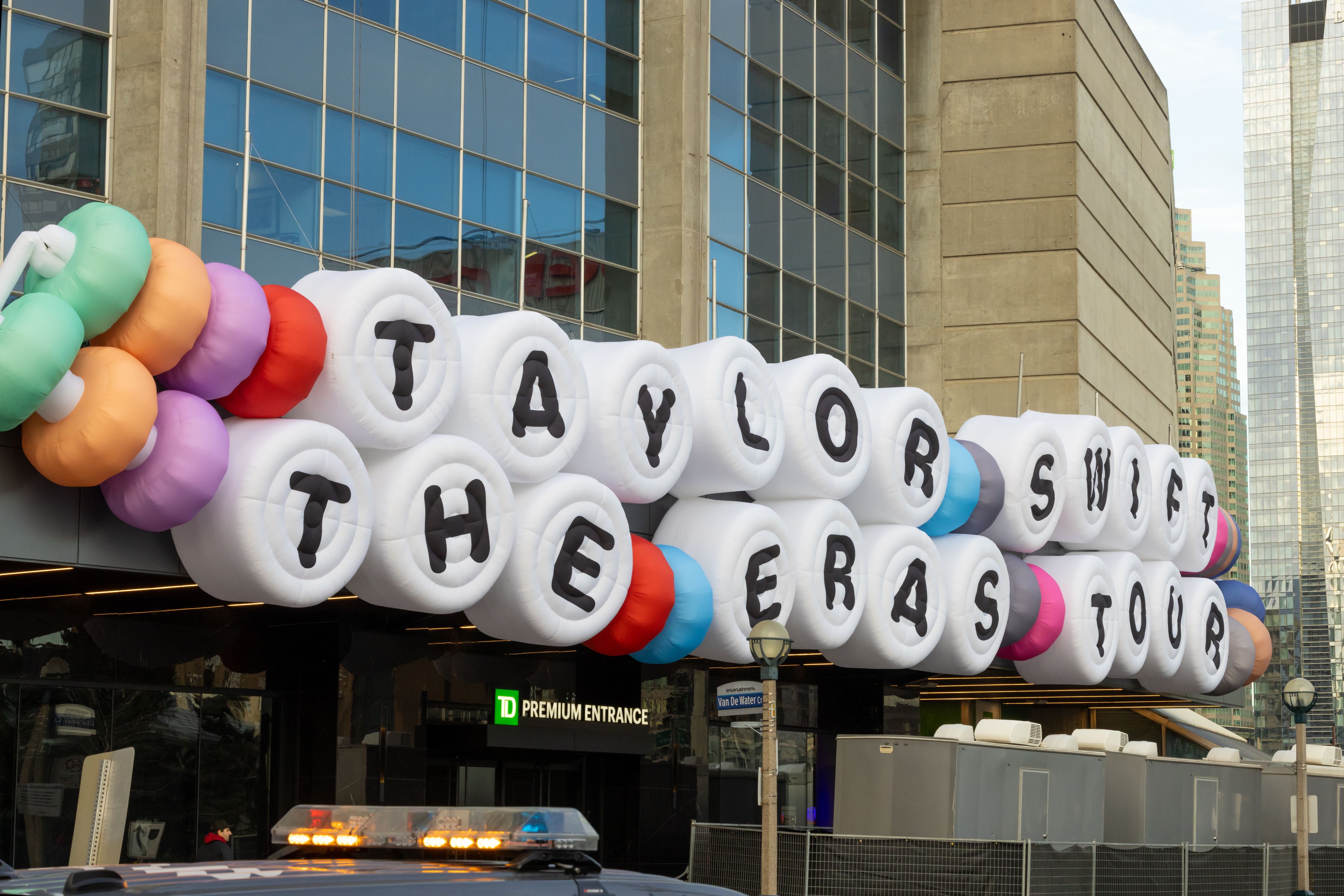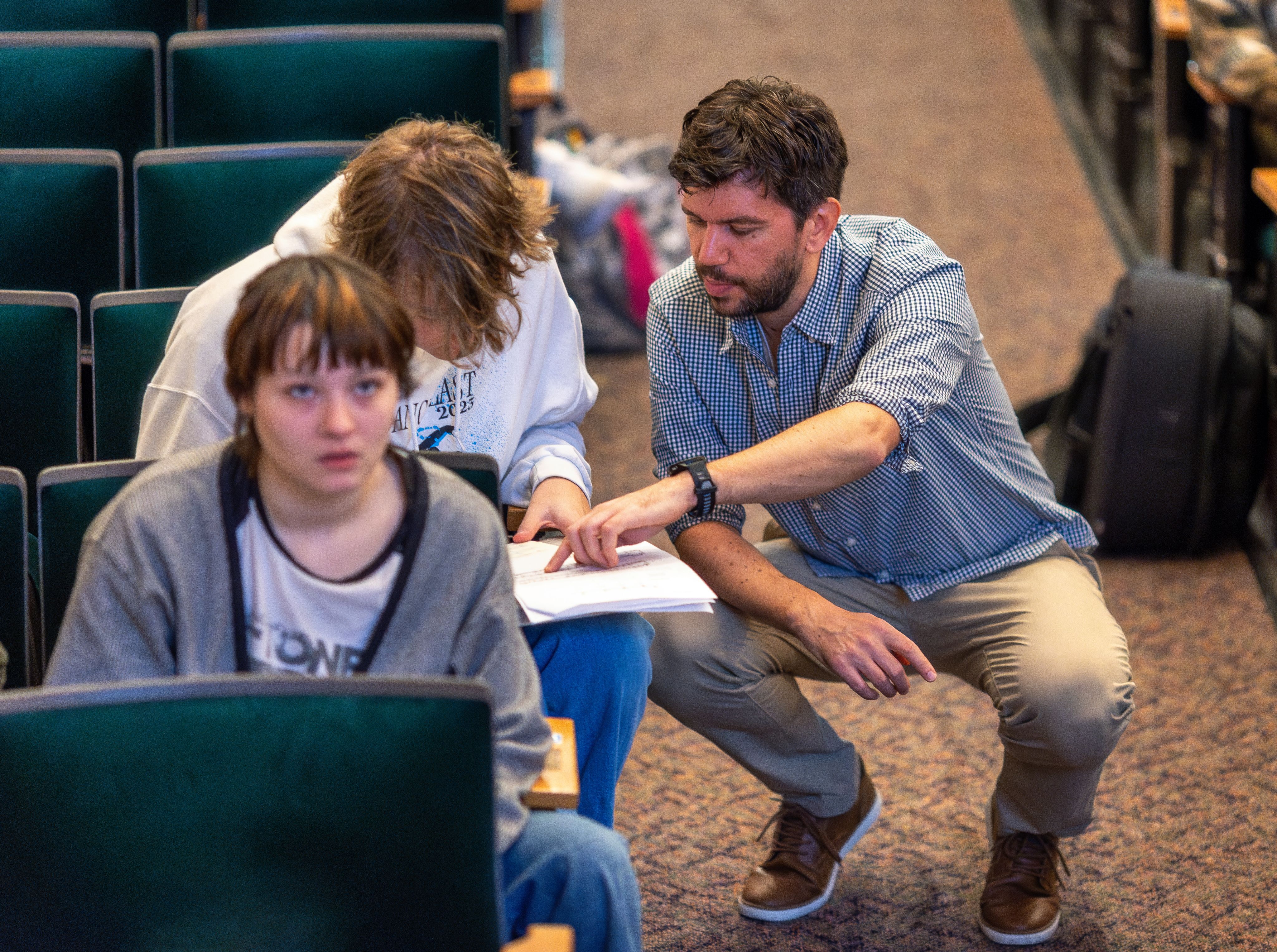Even if you're not a Taylor Swift devotee, you've likely gotten wind of the Oct. 3 release of her 12th studio album, "The Life of a Showgirl." Even more sparks have been flying after NFL star Travis Kelce popped the question.
You probably know she said yes. Your English teacher and your gym teacher are getting married. Swifties will get this.
They'll also get that her album, like the others, has its own color: sparkly orange.
Frankly, we'd prefer yellow. Or green. Yes, we know that's the color of her debut album. Some fans say it's teal. We'll agree to disagree.
But we're curious about Swift's unconventional album rollout, what "album" even means after eras of streaming singles, and Swift's uncanny ability to stay relatable as she keeps fighting dragons while building wealth and fame. And how does she keep the 'Swiftonomics,' the cultural and economic engine that is Taylor Swift, humming?
Cue associate professor Drew Nobile, pop music expert at the School of Music and Dance. Over the years, he's offered insights into Taylor Swift for Newsweek and other publications. For the record, he also teaches music theory and Beethoven.

Q: We're all streaming songs, so does this album even matter?
A: Musicians aren't required (or even expected) to produce albums anymore. An album is a vibe. It's whatever the artists and fans decide it is. The album release might be the main reason for it to exist. For Swift, albums are also a way to bring out her different personas. My guess is she'll explore the persona of a pop star in her mid-30s reflecting on touring.
Q: Is Swift a country, rock or indie-folk artist?
A: All of those, but also none of them. Swift, like many artists today, works hard to avoid being locked into a specific genre. As we've seen with other stars such as Beyoncé, she uses albums to experiment. The notion of genre is entering a new phase of social relevance as musicians try out different styles and start discussions about race, background, culture and other topics.
Q: How has the album evolved as a medium?
A: It began with the vinyl record. The '70s brought the rise of the concept album, though there were important precursors in the '60s like "Sgt. Pepper's Lonely Hearts Club Band." The '90s was the heyday of the CD album. In 2003, iTunes started offering individual song downloads and it seemed that albums were no longer necessary. But the album didn't die. It evolved.
Q: Was the announcement of 'The Life of a Showgirl' extraordinary?
A:Yes. But nothing Swift does is ordinary. We've never had a star this big in the history of pop music. The Beatles were big. But they were not everywhere, all the time, like Swift is. Despite being the wealthiest female singer with the highest-grossing tour in history, Swift has somehow maintained a perception of relatability. The rollout of this new album reflects that.
Q: So how did she roll out the album announcement?
A: Swiftie news has saturated our brains for months now, and it all helps build that buzz. In May, she bought the rights to her masters. Then the album release was teased gradually on social media this summer. By announcing it on a podcast with her soon-to-be fiance and his brother (an episode that broke streaming records), she made a big splash.
Q: Why announce it on Travis Kelce's podcast?
A: It's pure genius - an informal non-promotion promotion: "Dear friends, I'm really excited to share these songs I wrote! The color's orange. Oh, and I like baking sourdough bread."
Q: So is she just opportunistic?
A: No, I trust Swift as an artist. She's going to make a ton of money. But you can be commercially successful, write music that appeals to the masses and still create art.

Q: What's the album going to be like?
A: I think Swift is going to try and recapture some of that pop magic from earlier albums such as "1989" and "Lover." Her last few albums were successful but didn't hit in the same way. Max Martin and Shellback are the co-producers, and they last worked with Swift on "Reputation," which was more synth pop. Martin is responsible for some of the biggest hits of the last 25 years. Think Backstreet Boys, NSYNC and Britney Spears. Shellback works for the production company he cofounded. So I predict catchy, earworm pop.
Q: Was her engagement to Travis Kelce part of the marketing plan?
A: I'm not that cynical! But I'll bet the timing and the way it was announced was deliberate. Even though it probably wasn't planned that way from the beginning, I'm sure it was no accident either.
Q: Why does Swift seem so down to earth?
A: She retains her authenticity by sharing life experiences through her songs. And Swift doesn't do interviews. She communicates with fans through social media, lyrics and between-song concert banter. This helps her seem relatable and vulnerable, even though few (if any) of us can relate to her life.
Q: How are her albums all so different, but so popular?
A: Swift often seems to have her finger on the pulse of pop culture. Her timing is uncanny. For example, "Folklore" was released during the COVID-19 pandemic and captured the isolation and reconnection with nature so many of us experienced during that time.

Q: How do you use Swift's music to reach UO students?
A: It's a powerful conversation starter and a way to demonstrate the relevance of popular music. Most of what I talk about in class is not cultural events, but musical features. I might use a Swift song as an example for a chord progression. Then a student says "Ugh, Taylor Swift?" Others might be Swifties. Or they're just indifferent. So I ask the reasons for their opinions, and they're usually more about culture than music. Plus those earworm songs help students remember something during an exam.
Q: As a faculty member, can you give us a dose of deep Swiftie scholarship?
A: Through all the albums, performances and costume changes, Swift brings diverse personas to life, exploring and revealing different sides of herself. We all have personas. Think about how you dress and act at home, the office or a concert. The versions of you as a student, teacher, parent, friend or partner are all different. But they're all you. That doesn't make you fake. It makes you human. That's an interesting mirror that Taylor Swift holds up to us.






